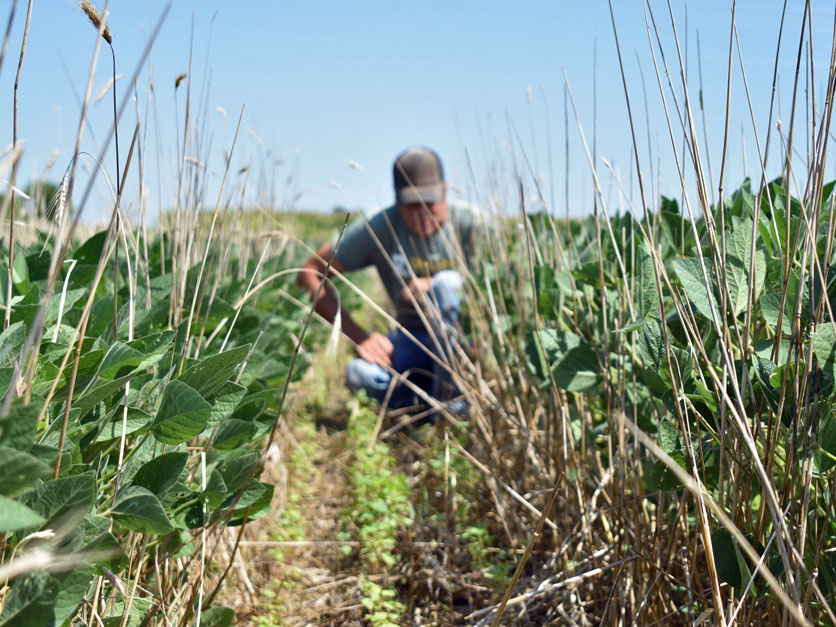USDA is taking steps to accelerate some of the $18 billion in new conservation funding provided by the Inflation Reduction Act for climate-related farming practices. Robert Bonnie, USDA’s undersecretary for farm production and conservation, says the department will be announcing a 30-day comment period on the funding within days.
Bonnie tells Agri-Pulse that USDA won’t be writing a rule for allocating the funding, but will instead provide directives to state offices to guide how the money is allocated.
By the way: Bonnie was speaking on the sidelines of the Sustainable Agriculture Summit in Glendale, Arizona, where he told the audience the Biden administration is working to make sure its ag-related climate initiatives have longevity, no matter which party is in power.
The way to do that, in Bonnie’s view, is to ensure that there is broad industry support for the initiatives, which include USDA’s $3.5 billion in climate-smart commodity projects.
“This is an opportunity for us to build a model for climate policy that is voluntary, incentive-based and that pencils (out) for U.S. agriculture,” Bonnie told the conference. “We have to move quickly. That policy window won't be open forever.”
EPA releases plan to address pesticide impacts on endangered species
The Environmental Protection Agency is proposing to protect endangered species from pesticides through a “menu” of mitigation measures designed to reduce runoff and spray drift.
The agency released an update Wednesday to its plan for addressing species protections early in the registration process and will hold a webinar today to discuss it.
“While EPA intends for this set of interim ecological mitigation measures to apply widely to many pesticides, EPA will consider the menu of options for any given pesticide depending on the level of risk that it poses to species and the exposure route,” the agency said.
Why it matters: EPA has been under legal pressure to address its obligations to protect species listed under the Endangered Species Act, which have delayed the already-long registration process.
UN pushing for Russian fertilizer exports and extension of Ukraine grain deal
The United Nations continues its efforts to get Russia to agree to an extension of the Black Sea Grain Initiative before it expires in just a few days. As part of that effort, the UN is working to facilitate Russian fertilizer exports, a UN spokesman said.
“What I can say, we’ve made it very clear that sanctions should not be applied to the food and fertilizers that we are trying to make sure have an open pathway to be exported,” the spokesman said. “And so, we’ve been going about the fairly extensive work that’s needed to make sure that all of the appropriate regulations and legal conditions are in place so that that can happen.”
UN Secretary General Antonio Guterres met with Russian Foreign Affairs Minister Sergey Lavrov and the head of the Ukrainian delegation to the Group of 20 on the sidelines of the G20 summit in Bali, Indonesia, to negotiate.
Andrey Sizov, head of the analysis firm SovEcon, says Russian demands for sanctions to be lifted on the Russian Agricultural Bank and the reopening of a pipeline to deliver ammonia from Russia to Ukraine, may be key to the talks.
Milk producers want faster access to feed additives for GHG reduction
Dairy farmers want to do their part to fight climate change, but they need the help of the Food and Drug Administration. The FDA needs to use its authority to speed up the process of approving new animal feed additives that would reduce greenhouse gas emissions, the National Milk Producers Federation told the agency.
“One of the greatest opportunities that exists for U.S. dairy farmers is their ability to provide real solutions to many of today’s biggest environmental challenges like GHG emissions,” Jamie Jonker, NMPF’s chief science officer, wrote in comments submitted to the FDA. “Embracing new practices and technologies is key to making America’s dairy farmers an environmental solution while providing wholesome and nutritious dairy products to the U.S. and the world.”
NMPF says that feed additives will play a key role in “a promising path toward a net-zero future for dairy,” but the U.S. is falling behind competitors in the European Union and elsewhere because governments there are quicker with approvals.
USDA announces small business research grant recipients
The Agriculture Department is awarding $21.6 million in research funding to small businesses for developing “transformative agricultural solutions,” the agency announced Wednesday.
The funding will support 34 research projects. One grant will go to the Louisiana-based Inventherm for developing a more cost-efficient sanitizing process for ice cream machines, while another will go to the New Jersey company Mirtech for a system that will add “10 to 12 days” of shelf life for fruits at the retail level.
The Small Business Innovation Research Program is operated by USDA's National Institute of Food and Agriculture.
Senate Aging Committee nutrition hearing postponed
The Senate Committee on Aging has postponed a nutrition hearing that was supposed to take place on Wednesday. The committee has not determined a new date for the hearing, a staffer told Agri-Pulse.
Questions? Comments? Tips? Send an email to bill@agri-pulse.com.





